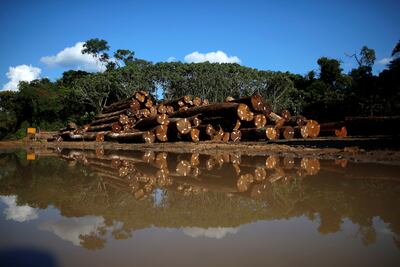More than 100 world leaders have signed a pledge to reverse deforestation in one of the first major agreements of the Cop26 summit in Glasgow.
The UK, US and UAE were among the countries collectively responsible for more than 85 per cent of the world's forests who put their names to the plan.
They plan to use $19 billion ($25.9 billion) in public and private finance to restore degraded land, tackle bushfires, protect indigenous people and focus on key areas such as the Congo Basin.
UK Prime Minister Boris Johnson described it as a "landmark commitment" and welcomed the fact that Brazil, which has courted controversy with its stewardship of the Amazon rainforest, was among the signatories.
He said the pact would support the Cop26 goal of restricting global warming to 1.5ºC above pre-industrial levels, because trees absorb carbon dioxide from the atmosphere.
"We have to stop the devastating loss of our forests, these great, teeming ecosystems, trillion-pillared cathedrals of nature," Mr Johnson told Cop26 delegates on Tuesday.
"With today’s unprecedented pledges, we will have a chance to end humanity’s long history as nature’s conqueror and instead become its custodian.”
Antonio Guterres, the Secretary-General of the UN, said the pledge was an important step.
But he added: "Signing the declaration is the easy part. It is essential that it is implemented now for people and planet."
The Glasgow Leaders' Declaration on Forest and Land Use will cover more than 33.6 million square kilometres, Mr Johnson's office said. It aims to reverse forest loss and degradation by 2030.
The agreement vastly expands a similar commitment made by 40 countries as part of the 2014 New York Declaration of Forests and goes beyond that in laying out the resources to reach that goal.
Under the agreement, 12 countries including Britain pledged to provide £8.75bn ($11.95bn) of public funding between 2021 and 2025 to help developing countries, including efforts to restore degraded land and tackle wildfires.
US President Joe Biden said Washington would lead the way with a $9 billion plan to restore millions of hectares of American forests.
"Conserving our forests and other critical ecosystems is an indispensable piece of keeping our climate goals within reach," he said.
"We need to approach this issue with the same seriousness of purpose as decarbonising our economies."
At least a further £5.3bn will be provided by more than 30 private sector investors including Aviva, Schroders and AXA.
The investors, representing $8.7 trillion in assets under management, also pledged to stop investing in activities linked to deforestation by 2025.
Five countries, including the UK and US, and a group of global charities on Tuesday will also pledge to provide $1.7bn to support indigenous people's conservation of forests and to strengthen their land rights.
Environmentalists say that indigenous communities are the best protectors of the forest and often stand against the violent encroachment of loggers and land grabbers.
Jair Bolsonaro, the President of Brazil, said his government was committed to ending illegal deforestation in the Amazon by 2030.
Mr Bolsonaro, who has previously played down Amazon fires and clashed with climate activist Greta Thunberg, spoke remotely to Cop26 delegates to call on "every country to help defend all forests".
Russian President Vladimir Putin, another virtual attendee, said his country was relying on its vast forested hinterlands to reach its carbon-neutral goals.
The agreement "will undoubtedly serve to fulfil the objectives of the Paris Agreement to reduce carbon dioxide levels in the atmosphere," he said.
Forests absorb about 30 per cent of carbon dioxide emissions, according to the World Resources Institute reported. Trees take carbon out of the atmosphere and prevents it from warming the planet.
But the natural climate buffer is rapidly disappearing. The world lost 258,000 sq km of forest in 2020, the i tracking initiative Global Forest Watch said – an area larger than the UK.

More than 30 financial institutions said they would make their “best efforts” to eliminate deforestation related to cattle, palm oil, soy and pulp production by 2025.
Simon Lewis, professor of global change science at University College London, said tackling deforestation was an essential component of keeping global warming below 1.5ºC.
“It is good news to have a political commitment to end deforestation from so many countries and significant funding to move forward on that journey,” Prof Lewis said. It was particularly welcome that indigenous peoples were eventually being acknowledged as protectors of forests, he said.
“However, the real challenge is not in making the announcements, but in delivering synergistic and interlocking policies and actions that really do drive down deforestation globally.
“Careful monitoring of the delivery of each initiative is essential for success,” he said.
Roberto Waack, Brazilian business leader and biologist and visiting fellow at international affairs think tank Chatham House, said: “The deal is a significant milestone on the road to protecting our precious forests and tackling the climate crisis.
“The deal combines action to stop deforestation with support for indigenous peoples who are the forest’s staunchest defenders. It also includes action to establish stronger sustainable forest economies.
“Today we celebrate – tomorrow we will start pressing for the deal to be delivered.”

